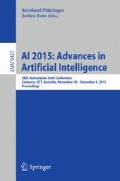Abstract
Granger causality has been applied to explore predictive causal relations among multiple time series in various fields. However, the existence of non-stationary distributional changes among the time series variables poses significant challenges. By analyzing a real dataset, we observe that factors such as noise, distribution changes and shifts increase the complexity of the modelling, and large errors often occur when the underlying distribution shifts with time.
Motivated by this challenge, we propose a new regression model for causal structure discovery – a Linear Model with Weighted Distribution Shift (linear WDS), which improves the prediction accuracy of the Granger causality model by taking into account the weights of the distribution-shift samples and by optimizing a quadratic-mean based objective function. The linear WDS is integrated in the Granger causality model to improve the inference of the predictive causal structure. The performance of the enhanced Granger causality model is evaluated on synthetic datasets and real traffic datasets, and the proposed model is compared with three different regression-based Granger causality models (standard linear regression, robust regression and quadratic-mean-based regression). The results show that the enhanced Granger causality model outperforms the other models especially when there are distribution shifts in the data.
Access this chapter
Tax calculation will be finalised at checkout
Purchases are for personal use only
References
Granger, C.W.: Investigating causal relations by econometric models and cross-spectral methods. Econometrica J. Econometric Soc. 37, 424–438 (1969)
Hiemstra, C., Jones, J.D.: Testing for linear and nonlinear granger causality in the stock price-volume relation. J. Finance 49, 1639–1664 (1994)
Lozano, A.C., Li, H., Niculescu-Mizil, A., Liu, Y., Perlich, C., Hosking, J., Abe, N.: Spatial-temporal causal modeling for climate change attribution. In: Proceedings of the 15th ACM SIGKDD International Conference on Knowledge Discovery and Data Mining, pp. 587–596. ACM, 1557086 (2009)
Roebroeck, A., Formisano, E., Goebel, R.: Mapping directed influence over the brain using Granger causality and fMRI. Neuroimage 25, 230–242 (2005)
Diebold, F.: Elements of Forecasting. Cengage Learning, Mason (2006)
Liu, W., Chawla, S.: A quadratic mean based supervised learning model for managing data skewness. In: SDM, pp. 188–198 (2011)
Liu, X., Wu, X., Wang, H., Zhang, R., Bailey, J., Ramamohanarao, K.: Mining distribution change in stock order streams. In: 2010 IEEE 26th International Conference on Data Engineering, pp. 105–108 (2010)
Ristanoski, G., Liu, W., Bailey, J.: A time-dependent enhanced support vector machine for time series regression. In: Proceedings of the 19th ACM SIGKDD International Conference on Knowledge Discovery and Data Mining, pp. 946–954. ACM (2013)
Gama, J., Žliobaitė, I., Bifet, A., Pechenizkiy, M., Bouchachia, A.: A survey on concept drift adaptation. ACM Comput. Surv. (CSUR) 46, 44 (2014)
Harchaoui, Z., Moulines, E., Bach, F.R.: Kernel change-point analysis. In: Advances in Neural Information Processing Systems, pp. 609–616 (2009)
Branch, M.A., Coleman, T.F., Li, Y.: A subspace, interior, and conjugate gradient method for large-scale bound-constrained minimization problems. SIAM J. Sci. Comput. 21, 1–23 (1999)
Seth, A.K.: A MATLAB toolbox for Granger causal connectivity analysis. J. Neurosci. Methods 186, 262–273 (2010)
Baccalá, L.A., Sameshima, K.: Partial directed coherence: a new concept in neural structure determination. Biol. Cybern. 84, 463–474 (2001)
Arnold, A., Liu, Y., Abe, N.: Temporal causal modeling with graphical granger methods. In: Proceedings of the 13th ACM SIGKDD International Conference on Knowledge Discovery and Data Mining, pp. 66–75. ACM (2007)
Demšar, J.: Statistical comparisons of classifiers over multiple data sets. J. Mach. Learn. Res. 7, 1–30 (2006)
Author information
Authors and Affiliations
Corresponding author
Editor information
Editors and Affiliations
Rights and permissions
Copyright information
© 2015 Springer International Publishing Switzerland
About this paper
Cite this paper
Luo, L., Liu, W., Koprinska, I., Chen, F. (2015). Discovering Causal Structures from Time Series Data via Enhanced Granger Causality. In: Pfahringer, B., Renz, J. (eds) AI 2015: Advances in Artificial Intelligence. AI 2015. Lecture Notes in Computer Science(), vol 9457. Springer, Cham. https://doi.org/10.1007/978-3-319-26350-2_32
Download citation
DOI: https://doi.org/10.1007/978-3-319-26350-2_32
Published:
Publisher Name: Springer, Cham
Print ISBN: 978-3-319-26349-6
Online ISBN: 978-3-319-26350-2
eBook Packages: Computer ScienceComputer Science (R0)

